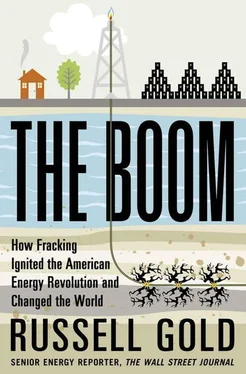Civilization has been heading toward source rock for a few thousand years; toward the geological kitchen where heat and pressure turned organic material into hydrocarbons. Now, with fracking, there’s a lot more oil and gas to be extracted. But once we’ve reached the source rock, we’ve gone as far back as possible. You can’t devise technology to dig deeper and reach even further back in geologic time. Source rock is where plankton turned into hydrocarbons. There is no further back. This is it.
2

OTTIS GRIMES
Drilling and fracking is a loud, noisy business. Smelly too. People rely on energy and enjoy its benefits, but who wants to live near a well? Sometimes the petroleum-laden rocks are conveniently remote. In 1967, drillers discovered Alaska’s enormous Prudhoe Bay oil field a couple hundred miles north of the Arctic Circle. Years later, floating drilling platforms tapped into massive oil and gas deposits in the deep waters of the Gulf of Mexico, a long helicopter flight from shorefront homes. The shale boom is different. Wells spread out across entire counties. As of 2013, more than fifteen million Americans lived within a mile of a well that had been fracked in the past few years.
This new proximity between wells and homes is one of the defining features of the new energy landscape. If wells weren’t allowed within a mile of the nearest home, United States oil and gas output would very likely be declining. But that isn’t the path we’ve chosen. The country and its courts long ago decided that unfettering drillers provided desirable rewards. Some homeowners would be compensated for their troublesome new neighbors; others weren’t so fortunate. This arrangement is being tested in the era of fracking.
To better understand the complex relationship between drillers and homeowners, why it was codified, and how it enabled the birth of fracking in the United States, it helps to go back to where it started.
In March 1919 an itinerant oil driller named Ottis Grimes bought a house for his family in Burkburnett, Texas. Until a year earlier, there were a thousand residents in this town near the Red River in the northern part of the state, along with a bank, hotel, and cotton gin. Then a local farmer drilled a well and found a lot of oil.
Burkburnett’s metamorphosis was sudden and complete. Wildcatters, land speculators, and oil-field workers turned the small prairie community into a bustling hub of humanity. By the time Grimes arrived, the sidewalks were too packed to walk down. Restaurants welcomed patrons around the clock. Several dance halls opened, and then were closed for “immoral” activities. There was even a drug bust. Sheriff’s deputies confiscated $42,000 worth of morphine sulfate—the equivalent of about three-quarters of a million dollars when adjusted for inflation.
The population quintupled in a couple years. It was a quintessential boomtown. The 1940 Hollywood movie Boom Town, featuring Clark Gable and Spencer Tracy as wildcatters-turned-tycoons fighting over the same woman, was inspired by Burkburnett.
The transformed city bore all the hallmarks of early oil production. “The air was permeated with a strong smell of petroleum,” a historian noted. Hundreds of ten-story derricks, built from longleaf yellow pine, towered over the city. “Burkburnett is now like a huge pin-cushion,” a visitor remarked. Derricks were often only fifty feet from each other.
Traffic and oil spills turned the city’s dirt roads into a fetid mess. A black-and-white photograph showed a black creek running between homes. “Oil a mile long,” was etched into the print. The month before Grimes bought his home, two British insurance syndicates canceled liability coverage in Burkburnett. Their reason was the town was so low on water that fighting the frequent well fires was impossible. An influenza outbreak was followed by smallpox.
The toll on the town was matched by the opportunity for wealth. In November 1919, the local paper reported an oil company out of Dallas paid a record $100,000 to drill on a single acre. The local school leased its land for $14,000 and built a new high school with the money. The entire city was gripped by oil fever. “To try to talk about anything except oil,” said a journalist, “would create as much consternation as a rebel yell at a spiritual séance.”
The Burkburnett boom was different from other early-twentieth-century discoveries in one important respect: the oil was found in and around—and under—a town that had been platted and subdivided into hundreds of small homesites. The oil field was not on a remote ranch. The oil field was Burkburnett. Many people received leasing payments and royalty checks. It was the first time that energy production had landed, quite literally, in people’s backyards. Or front yards, as was the case with Ottis Grimes.
He bought his home, a four-room frame house on a small lot, but there was a catch: the transaction didn’t include the mineral rights, creating what’s known as a “split estate.” Grimes owned the land and the house. H. L. Bunstine, who worked for Magnolia Petroleum (later Exxon Mobil) and sold him the house, kept the oil underneath.
Within days after the sale, armed Goodman Drilling workers entered the property. They erected a soaring derrick that Grimes said posed a “constant menace” of toppling in the strong winds and flattening his home. The shaft of a several-hundred-pound steam engine spun throughout the night within inches of his stoop, and a steam boiler was deposited behind his home. Workers built a “slush pit” to hold noxious drilling fluid so close to the house that windows were spattered. Grimes and his wife couldn’t sleep. They had to yell to talk inside their living room.
Grimes sued to stop the drilling, claiming that Goodman Drilling had turned his domesticity into a nightmare. The company’s lawyers replied that any delay would allow nearby wells to suck out all the oil. A considerable number of the company’s employees would need to be laid off. Anyway, this was Burkburnett, the lawyers argued, and “the injuries complained of… are but those commonly sustained by the inhabitants of the town.” As many as four wells were being drilled on any given day in Burkburnett and if the court granted the requested injunction, they said, the oil-greased wheels of commerce would stop turning.
A nearby judge ruled in favor of the drillers, and Grimes appealed to a court in Fort Worth, where other judges also said he was out of luck. He owned the surface, but not the mineral rights beneath his property. “He is in no position to complain of conditions,” the judges wrote, “such as are usual and customary during the drilling of an oil well.”
After losing his court fight, Grimes and his wife sold their house and left the oil patch. They moved to the Texas-Mexico border and raised dairy cows, according to census data and land records. The legacy of the case, however, outlived his short stay in Burkburnett and influenced the modern energy boom. The Grimes vs. Goodman Drilling ruling set the legal framework in Texas, and for decades turned up as precedent in other oil and gas exploration cases.
“The general rule has been pretty much the same since the Grimes case,” said Barney Fudge, who grew up in Burkburnett in the 1940s and serves as a judge in the 78th District Court, where the Grimes case was originally heard in 1919. “Whoever has the mineral rights is the dominant estate. Texas did that because the hydrocarbons were so valuable. I think it was a policy decision by the courts.”
Other states copied Texas’s legal approach. The oil industry had the right to drill wherever it owned the minerals. And not just drill: build roads, tear down fences, put in pipelines, and use water wells. The dominance of mineral rights was an invaluable boost to the fledgling oil industry. Eager for the benefits of energy production, politicians and judges created favorable conditions for the United States to become a giant oil and gas producer in the twentieth century.
Читать дальше













